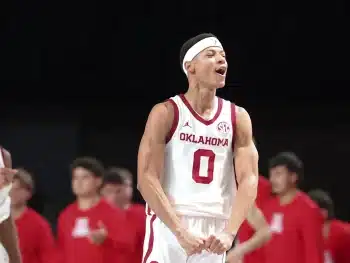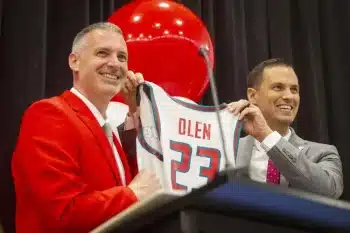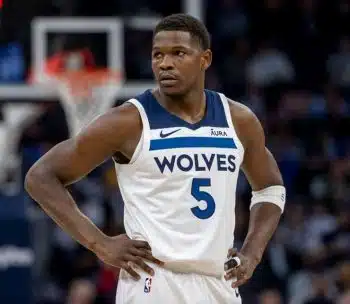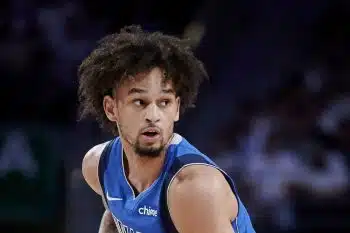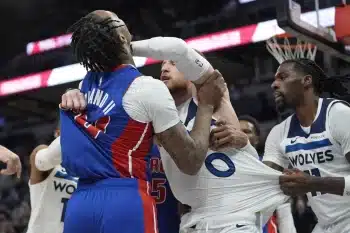NBA
NBA Daily: Is Mitchell Robinson’s Injury a Blessing in Disguise?
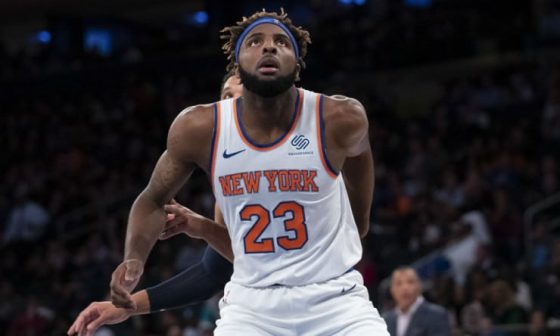
The New York Knicks are right in the middle of a playoff push. They are currently in the eighth spot in the Eastern Conference and they appear to be in good shape to at least qualify for the play-in tournament, 6.5 games ahead of the 11th seeded Toronto Raptors.
The Knicks have remained in the playoff picture despite starting center, Mitchell Robinson, missing 23 of the team’s 55 games.
Most recently, Robinson exited a March 27 contest against the Milwaukee Bucks in the first quarter with a broken foot. Including the March 27 game against Milwaukee, New York has won five of their last 10 games without Robinson.
As recently as last season, Robinson was viewed as the team’s answer at center – and, along with RJ Barrett, the team’s only long-term building blocks. This take has aged badly given the progress made by Julius Randle and the success had by rookie Immanuel Quickley (and to a lesser degree, Obi Toppin.)
But in celebrating the team’s present, it’s fair to question their future – does New York’s success without Robinson mean he’s expendable?
The 2020-21 season has been challenging for Robinson, who already missed 15 games earlier this year with a broken right hand. Somewhat miraculously, the Knicks have continued their strong play without Robinson In total, New York is 13-11 without Robinson and just 15-16 with him.
The timing of the injury is apropos.
The Knicks and Robinson were expected to engage in contract discussions this offseason. They still have some time to figure out a path forward, but the injury makes an otherwise straightforward contract negotiation trickier. The Knicks possess a team option for Robinson in 2021-22 for $1.8 million, which is significantly below market value for a player of Robinson’s stature.
Robinson is averaging 8.3 points, 8.1 rebounds and (a career-low) 1.5 blocks per game. He’s also averaging a career-high 27.5 minutes per game, due — in part — to his ability to avoid fouls. Robinson averaged 3.2 fouls per game last season, fouling out of seven games. He’s down to 2.8 personal fouls per game this year and hasn’t fouled out of a single contest.
A long-term agreement appeared likely between the Knicks and Robinson prior to his (presumably) season-ending foot injury. Similarly skilled, albeit more polished, players have signed significant deals in the recent past. Clint Capella signed a 5 year/$90 million deal in 2018, which is higher than what most expected Robinson to fetch — but it probably would have been referenced in negotiations.
Following the injury, a smaller deal is likely — if at all. The Knicks will probably still pick up Robinson’s option, but they could either trade him or let him play out next season without an extension. And while the Knicks must decide if they’d like to prioritize Robinson, Robinson must decide how much of a discount, if any, he’s willing to accept from New York (or anyone.) Robinson just signed with his sixth NBA agent (Thad Foucher of the Wasserman Group) and he’s expected to chase some of the money he missed out on by skipping the 2018 NBA Draft Combine and falling into the second round.
But Robinson shouldn’t push too hard in negotiations as the Knicks can just as easily turn to someone on their current roster as his replacement — and it would cost them far less in guaranteed money.
Enter Nerlens Noel. Noel has been a pleasant surprise for president Leon Rose and Knicks’ fans alike. He’s averaging 5 points, 6.3 rebounds and 2.1 blocks per game on the season; but he’s come off the bench for much of it, receiving just 23.1 minutes per game.
But even in limited time, Noel has had a major impact on the team’s defensive. He’s first in the NBA in defensive plus-minus (3.3), second in the percentage of the team’s blocked two-point field goal attempts (8.9%) and third in defensive win share (2.7).
And he’s been even better in Robinson’s absence. In his last 10 games, Noel is averaging 5.4 points, 7.4 rebounds and 2.7 blocks in 26.1 minutes per game.
Noel signed in New York for just one year/$5 million this past offseason. While that is cheap relative to other starting-caliber centers, he’s not doing anything he hasn’t done in the past. Noel is averaging fewer points, assists and steals per game while securing more blocks and essentially the same number of rebounds. So, if teams knew what Noel could do entering 2020-21, why would they pay him more next season for the same output? Unfortunately, free agency is a fickle beast and there’s no rhyme or reason as to why teams weren’t interested in like Noel last year — but the Knicks will likely have the upper hand in negotiations.
Ultimately, the Knicks’ desire to keep Noel shouldn’t influence their preference to re-sign Robinson. Remember, Robinson set the single-season record for field goal percentage last season (74.2%) and he averages greater than two blockers per game over his career. He’s an elite lob target, and he closes out on shooters better than just about anyone in the league.
Contract negotiations are a zero-sum game in which one party wins at the expense of the other. Robinson and the Knicks should enter into negotiations delicately. Robinson probably feels owed given his cumulative salary relative to his past performance, and the Knicks were probably hoping for a more concrete body of work, leading to more certainty around an offer.
The reality is that Robinson has struggled with injuries — this year and in previous seasons — and his game hasn’t developed significantly since his rookie season. He is also a very unique talent who should get even better with more time under coach Thibodeau.
So for the best possible outcome, all parties must concede.
The Knicks are best with both Robinson and Noel. As much as Robinson’s injury will hinder how far New York can go this season, it can be key in their future. If Robinson and Noel are amenable to the idea of returning at a slight discount, it can ensure their defensive excellence continues — and if it’s at the right number(s), it should allow for considerable financial flexibility to continue maneuvering.
And the Knicks haven’t been savvy maneuverers in a long time.
